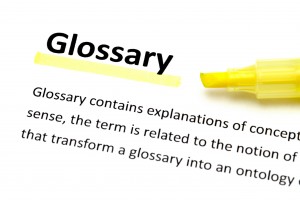
We hope you enjoyed Part 1 of our three-part series explaining some common legal terms you might come across during your court case. We continue the series today with Part 2, which covers letters I though R. Part 3 will be posted next week.
Legal Terms You Should Know
Here are some common legal terms you might come across:
Indictment – A formal charge put forth by a grand jury stating that there is enough evidence to justify moving forward with a trial.
Injunction – A court order that prevents one or more parties from taking a certain action.
Judgment – An official decision by the court that resolves the initial dispute.
Jury – A group of people chosen to hear evidence and render a verdict in a trial.
Lawsuit – Legal action taken by a plaintiff against a defendant based on a complaint that the defendant committed an act or failed to preform an action which resulted in harm to the plaintiff.
Misdemeanor – An offense punishable by up to a year in prison and up to a $1,000 fine.
Mistrial – A mistrial occurs when the judge determines that a fundamental error has made it unlikely that one side will receive the fair trial they deserve. When a mistrial is declared, the trial will start over with the selection of a new jury.
Motion – A request by either side to the judge for a decision on some case issue.
Oral Argument – The time when lawyers can summarize their position to the court and answer any of the judge’s questions.
Parole – A release of an inmate after the person has completed part of their prison sentence. The person on parole – known as the parolee – needs to follow a certain set of guidelines in order to maintain their release in the community.
Plaintiff – The person who files the legal complain with the court.
Plea – The defendant’s statement in answer to the charges levied against them, generally “guilty,” “not guilty” or “no contest.”
Precedent – An earlier court decision that shares similar facts and legal issues. Generally a judge will “follow precedent” with similar rulings, meaning that they use the principles established in an earlier case as the basis for their ruling.
Pretrial Conference – A conference between the judge, the prosecution and the defense to discuss what matters will be presented to the jury, what evidence and witnesses will be used and when trial will commence. Settlements and potential plea deal are also discussed at this meeting.
Probation – Instead of being sent to jail, a person may be placed on probation, meaning they are essentially on supervised release in the community. The person will have to follow some probation guidelines, like curfew enforcement, abstaining from drugs and alcohol or home monitoring.
Record – The written account of the happenings in a case.





